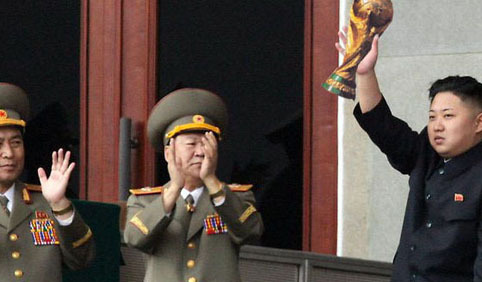Making sense of England and the world
Making sense of England and the world


By Max Grieve
Sepp Blatter stood high atop the House of FIFA, a fierce wind roaring through his thick mane of hair, and the people of the world came together before him. As storm clouds gathered above, he thrust his arms out wide to reveal two stone tablets inscribed with the names of a hundred nations. He moved to speak, and a hush fell across the masses.
“Let the people be aware of the most recent FIFA/Coca-Cola World Rankings,” he bellowed, and with white robes whipping across his sculpted torso, he continued.
“Spain,” he boomed, though this was no surprise. Nobody had blinked.
“Germany.” Again, there was no movement.
“England.”
Cracks opened up in the ground, and the sky turned a nightmarish red. The people scattered, screaming, and they threw spears, discs and shotput-ty things at the divine in a terrifying frenzy. Those who made it home flung themselves at their computers, and told anyone who hadn’t been present of the impending Apocalypse. Back at FIFA HQ, Blatter was still blithering to empty space. Turning their heads from the golden shine that was blinding the capital, the English acknowledged their new standing, then went back to the beach volleyball – Brazil were on.
England are the third-best ranked footballing nation in the world. And contrary to the cries of anyone who believes in logic and justice, it all makes perfect sense.
Firstly, the heinously complicated system of calculations used to determine the rankings doesn’t actually require a mathematics PhD to approach, nor must one be a member of the Brethren of the Court of FIFA to have a complete understanding of it’s mysteries. It’s all actually rather simple, and explained in length in here.
Before we lose our heads, a common reaction to the release of the rankings each month, let’s consider the following. England haven’t actually lost a competitive match since that wonderfully amusing night in Bloemfontein in 2010, if we are to disregard the loss on penalties to Italy earlier this year – and you would, having read the explanation of the ranking system in full. Since friendly results count for so little, we can also ignore losses to France in 2010 and the Netherlands on Stuart Pearce’s big day out prior to the Euros and the appointment of the messiah from Croydon. As the rankings take into account results over four years, England’s current position is a reflection of two qualifying campaigns in which England won 14 matches, drew 3, and lost only one; a record similar to that of Italy.
Conversely, Brazil’s lack of competitive matches since the dismal 2011 Copa América campaign has meant that going into the Confederations Cup, and following that the World Cup, they are unlikely to be ranked amongst the top five nations in the world, especially as every nation around them will be playing out various qualifying campaigns. Brazil may not even be in the top ten come 2014 – but then it doesn’t really matter.
Another thing to take into consideration is that the rankings are often delayed by some time, though this doesn’t affect England’s current situation. Uruguay, for instance, are still living off their Copa América victory to some extent. Poor performances at the last three international tournaments (2008, 2010, 2012) mean that France, a fairly competent team that most would value above England or Greece, currently sit 14th in the rankings. All the way down in 91st place, the people of North Korea wait patiently for their 2010 World Cup victory to have an impact on their position.
As quickly as the wildfire spread over the Twitterlands, those with any comprehension of how good England actually are doused it in great buckets of reason and water. Anyone with a basic understanding of how to feed themselves could appreciate that England aren’t the third-best footballing nation in the world. The FIFA rankings have a habit of making a mess of reality, such as when the United States was placed fourth in 2006, or when the top twenty ‘elite’ was bothered by the Scottish (said then-national team manager Craig Brown, 'I don’t hold any weight in Fifa’s rankings. When I managed Scotland we were in the top 20 in the world and that was nonsense’).
There was ironic celebration, but the English are under no illusion either, though I couldn’t speak for Ashley Cole, Wayne Rooney, John Terry and any other brainless members of the national team. Simply, England aren’t very good, but they get the job done. For me, a player with imaginary skills worthy of any Nike advert featuring Roberto Carlos (Olé!, or the one in which the plane is delayed), I’m appalled by this attitude of doing enough to get by, but it works.
England won’t win the next World Cup. They probably won’t win any of the next ten World Cups. They will, barring a plague which both wipes out the entire population and all of England’s green and pleasant land, continue to plod along, often boring and unbeaten, and mill around the top ten in the FIFA rankings where they’re not really wanted by anyone. Let them pretend that they’re in the pantheon, while we wait for their next penalty shootout.







